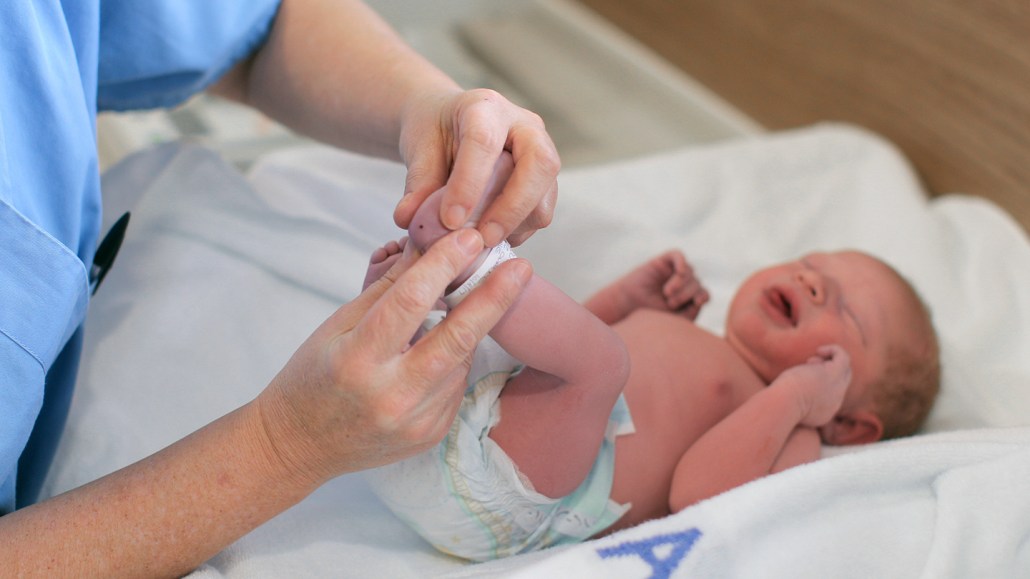A classical lullaby helped reduce newborns’ pain during heel pricks
Easing newborns’ pain is important for neurological development and later pain perception

In a clinical trial, a classical lullaby helped to alleviate newborns’ pain during a heel prick, a procedure to collect blood for certain tests after birth.
Petri Oeschger/GettyImages
The soothing tones of a classical lullaby may help to relieve the pain newborns can feel from routine medical procedures. The mellifluous method could be a beneficial addition to other pain-easing tactics.
In a randomized clinical trial at a hospital nursery, newborns received a sugar solution — a standard method to lessen pain — before a heel prick. Around half of the infants also had a classical lullaby playing from speakers near their beds before, during and after the procedure. The lullaby group scored lower on a newborn pain scale at the time of the prick and after, compared with the group that only got sugar, researchers report August 29 in Pediatric Research.
“Since they gave sucrose, it’s hard to say yes, music by itself would help,” says Mallory Perry-Eaddy, a pediatric intensive care unit nurse and a nurse scientist at the University of Connecticut in Storrs. But combining music with other pain-relieving methods “could be really useful.”
Until fairly recently, the medical community did not believe newborns experienced pain. But over the last several decades, studies have revealed that infants do perceive pain, and they may be more sensitive to painful stimuli than adults are. Enduring repeated pain-inducing procedures without pain-relief treatment can have lasting neurological consequences for infants, including a heightened perception of pain.
“It’s very important that we do try to stay on top of [pain] prior to procedures,” says Perry-Eaddy, rather than just trying to alleviate pain afterwards.
Heel pricks and shots are among the routine procedures newborns have soon after birth that can cause pain. The heel prick produces a few drops of blood for tests, including to check for certain disorders. Generally, for minor procedures like a heel prick, doctors and nurses turn to pain-reducing methods that don’t involve medication, says Saminathan Anbalagan, a neonatologist at Lincoln Medical and Mental Health Center in the Bronx, N.Y. Among these methods are skin-to-skin contact between a parent and an infant, breastfeeding and giving a newborn a sugar solution.
At Anbalagan’s hospital, the sugar solution combined with any of the other non-pharmacological approaches is the standard protocol, he says. He and his colleagues wanted to study music as another potential option that could be easily implemented and is cost-effective.
The research team randomly sorted 100 infants born at Lincoln into a lullaby and a no-music group. For the lullaby group, the song “Deep Sleep” from Bedtime Mozart: Classical Lullabies for Babies began playing 20 minutes before the heel prick and continued for another five minutes after. The researchers assessed pain with a neonatal infant pain scale that considers newborns’ facial expressions, whether they cry, their breathing patterns and other signs. The pain scale ranges from 0 to 7.
During the heel prick, the no-music group had an average pain score of just under 7. But serenading the infants with a classical lullaby reduced the score to below 5. After that peak, the overall score steadily dropped for both groups in the next five minutes, with the lullaby group continuing to score lower.
More research is needed to better understand neonatal pain and determine the most effective ways to relieve it, including the optimal combination of methods, Anbalagan says. But “proven and safe therapies are currently underused for routine minor, yet pain procedures,” according to the American Academy of Pediatrics. Along with investigating the effectiveness of music as a pain-relief method, Anbalagan and his colleagues sought to bring awareness to newborn pain with their study.
“While the misconception [about newborns and pain] has faded, it continues to be a common way of thinking in some health care settings,” he says. “Why some hospitals don’t have protocols for pain relief from minor procedures in neonates remains puzzling.”







